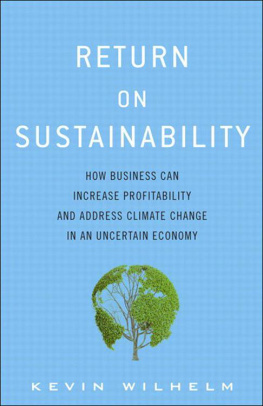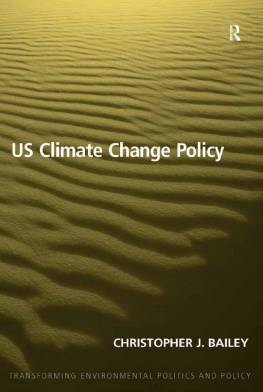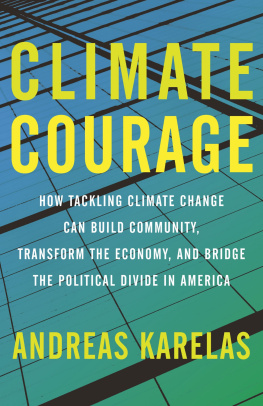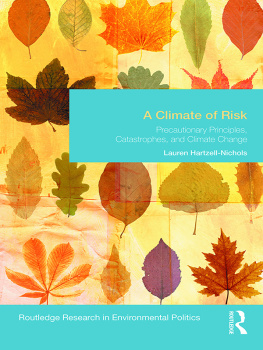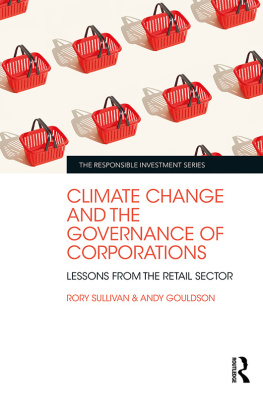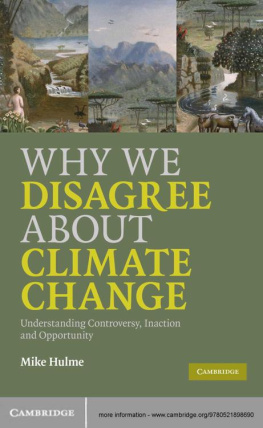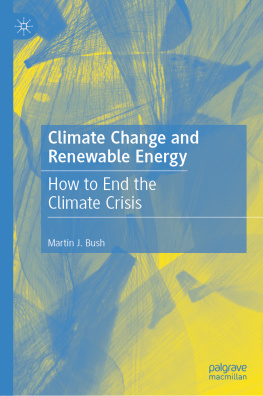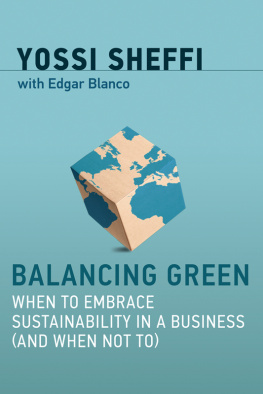Return on Sustainability
How Business Can Increase Profitability and Address Climate Change in an Uncertain Economy
Kevin Wilhelm
Foreword by Bob Willard
Vice President, Publisher: Tim Moore
Associate Publisher and Director of Marketing: Amy Neidlinger
Editorial Assistant: Pamela Boland
Operations Specialist: Jodi Kemper
Marketing Manager: Megan Graue
Cover Designer: Chuti Prasertsith
Managing Editor: Kristy Hart
Editor: Kaia Peterson
Manufacturing Buyer: Dan Uhrig
2013 by Kevin Wilhelm
Published by Pearson Education, Inc.
Publishing as FT Press
Upper Saddle River, New Jersey 07458
FT Press offers excellent discounts on this book when ordered in quantity for bulk purchases or special sales. For more information, please contact U.S. Corporate and Government Sales, 1-800-382-3419, .
Company and product names mentioned herein are the trademarks or registered trademarks of their respective owners.
All rights reserved. No part of this book may be reproduced, in any form or by any means, without permission in writing from the publisher.
Printed in the United States of America
First Printing May 2013
ISBN-10: 0-13-344550-X
ISBN-13: 978-0-13-344550-3
Pearson Education LTD.
Pearson Education Australia PTY, Limited.
Pearson Education Singapore, Pte. Ltd.
Pearson Education Asia, Ltd.
Pearson Education Canada, Ltd.
Pearson Educacin de Mexico, S.A. de C.V.
Pearson EducationJapan
Pearson Education Malaysia, Pte. Ltd.
Library of Congress Control Number: 2013935818
Table of Contents
Acknowledgments
This book could never have been possible without the work and support of my wonderful staff at the time of this writingRuth Lee, Anne DeMelle, and Jessie Alan. Throughout the entire process of writing this book, they put in tireless hours of research, writing, and editing to truly make this book what it is today. They challenged my thoughts, tore apart my work, and put up with my chicken-scratch type edits.
To Ruth, who has been with me the whole time at SBC, I am so thankful for everything youve done to not only make this book a success, but our company a success. Thank you for all your last-minute thoughts, help on images, and everything you did to bring this to fruition. It is a pleasure to come to work with you every day. You motivate me to be a better consultant, boss, writer, and person. You are joy to work with, are the absolute best employee and business partner Ive ever had, and this company would not be where it is today without you.
Id like to thank Elisa Pond for her research, Kaia Peterson for her amazing edits and insight, and Bob Willard for serving as a source of motivation for me in my day to day business pursuits.
Id also like to thank all of my friends, colleagues, and the BGI gang who persuaded me to write this book, but especially Meghan Golden and Mary Rick for their constant encouragement and amazing friendship.
However, above and beyond anyone else, none of this would have been possible without the support and encouragement of the love of my life, my wife, JO. You are my inspiration for this book, and you more than anyone else, are responsible for my passion and commitment to saving the environment. Thank you for your patience during this entire process, for your help and understanding during those long winter nights and weekend afternoons when I stayed home and sequestered myself to the couch to write this book. If not for you and the countless bits of wisdom that youve imparted on me over these past 18 years, I never would be in this field, and I certainly would never have written this book. You are my reason for being, and there is not a more fortunate husband on this planet. I love you.
Foreword
By Bob Willard
The 2007 Intergovernmental Panel on Climate Change (IPCC) reports state that we only have a few years in which to stabilize our greenhouse gases (GHG) before we experience irreversible and precipitous climate change.
These are crises, and they have planet earth teetering on the edge of a tipping point. We are in a race to see if humanity can save the world that nurtures us. Happily, solutions are known and within our capabilities. We do not have a deficiency of solutions, but a deficiency of leadership. We need to stop unsustainable practices that are precipitating this planetary emergency. We need to declare a War on Climate Change to galvanize our collective resolve. This can and needs to be done, even during the uncertainty of our current economic situation.
We can bring the same level of urgency and resources to the climate, energy, and ecological crises as we have to the War on Terror. Governments AND corporations need to take leadership actions to future-proof society. This book succinctly describes benefits that companies can reap from actions motivated by enlightened self-interest, so long as those corporate efforts are focused and supported by the following six bold actions that immediately address the pervasive monumental environmental and social challenges facing us.
1. Support integrating Education for Sustainable Development (ESD) throughout all education systems.
The goal of the United Nations Decade of Education for Sustainable Development, 20052014, is to integrate the principles, values, and practices of sustainable development into all aspects of education and learning throughout the world, and this needs to be extended to corporations. This education enables business leaders to improve the mindsets of their employees, suppliers, vendors, and customers about the personal relevance of sustainability, the dangers of climate change and other social and environmental crises, and the urgent need for action. An informed population gives business and political leaders their mandate for change.
2. Lobby for replacing the GDP with a GPI.
A Genuine Progress Indicator (GPI) integrates health care, safety, environmental, and other indicators of well-being in conjunction with the Gross Domestic Products (GDPs) financial and economic metrics to form a more holistic assessment of national progress. Endorsement of an annual report on national genuine wealth would legitimize value other than financial capital. Also, including an assessment of the national carbon or ecological footprint would awaken stakeholders to the need for urgent action on climate change and reinforce GPI as a strategy to boost corporate action and attention to these important issues.
3. Promote ecological tax shifting.
Much of our tax system is upside down; we are taxing positive actions and incentivizing negative actions. Instead of payroll taxes, which discourage new hiring, we should tax carbon to discourage pollution and waste. We should incent employment, renewables, capital investment, responsible consumption, and energy efficiency. Revenue-neutral shifting of taxes from things we do want to things we dont want will send strong behavioral-change signals to important corporate stakeholders.
4. Request elimination of perverse subsidies.
Today, governments of industrial countries subsidize the fossil fuel industry with more than $200 billion annually. In 2005, between $29 and $46 billion of that went to the US fossil fuel industry alone. These are perverse subsidies because they subsidize environmentally destructive behavior. Citizens are billed twice for fossil fuels: once when their taxes pay for the subsidies and again when they bear the direct and indirect costs of environmental mitigation and health care costs. As with ecological tax shifting, perverse subsidies should be shifted from fossil fuel and nuclear industries to clean-tech industries.

